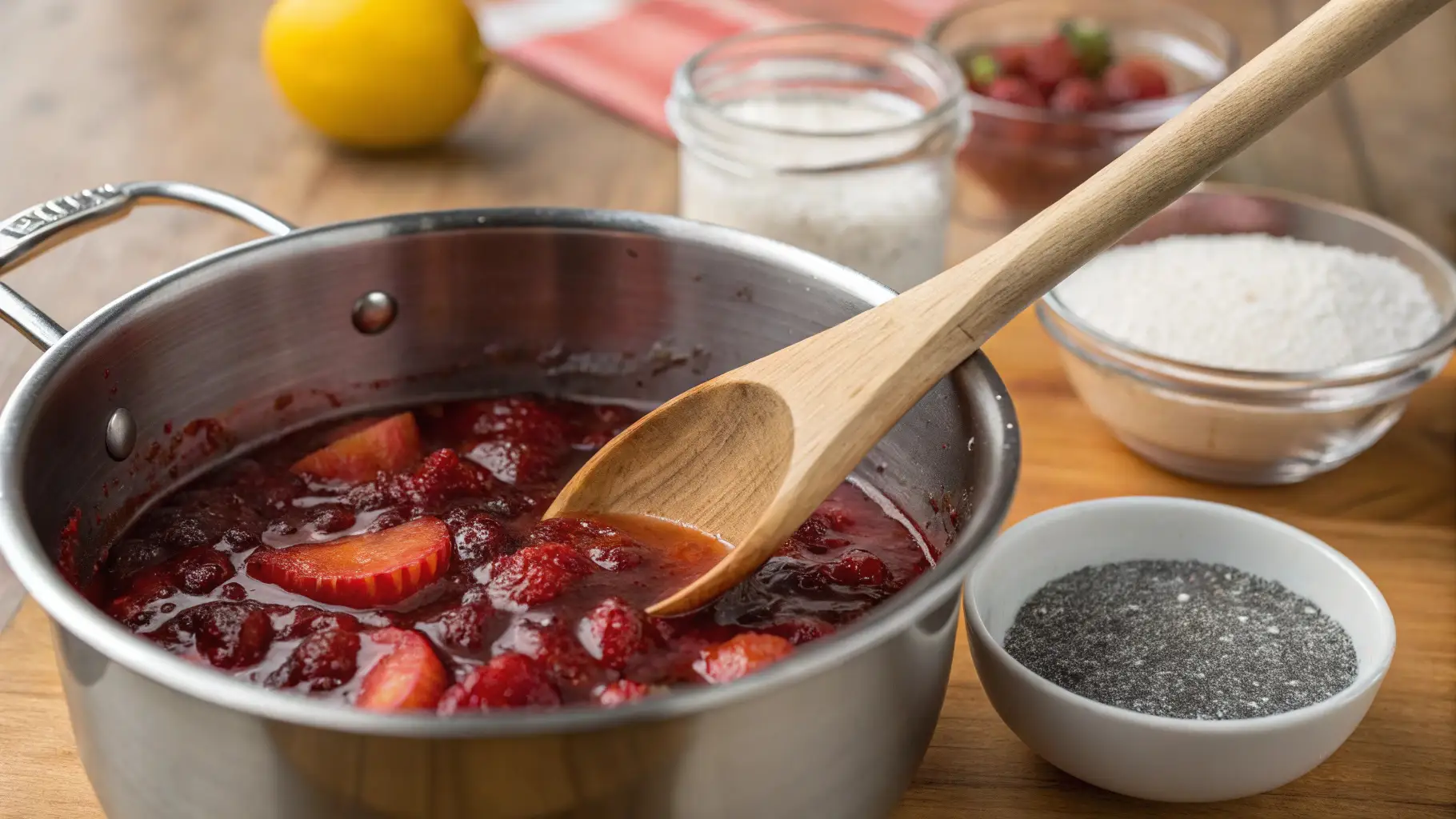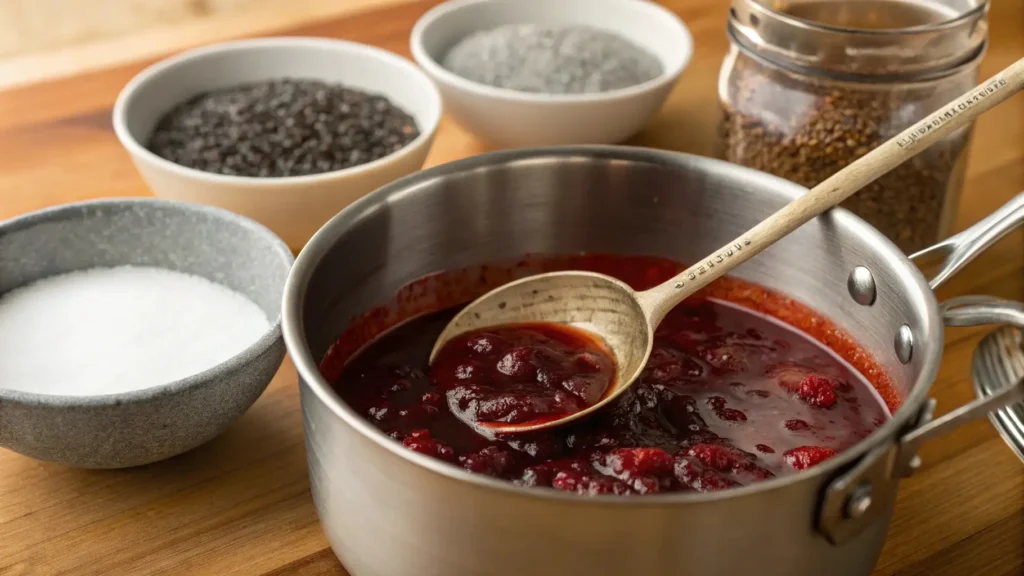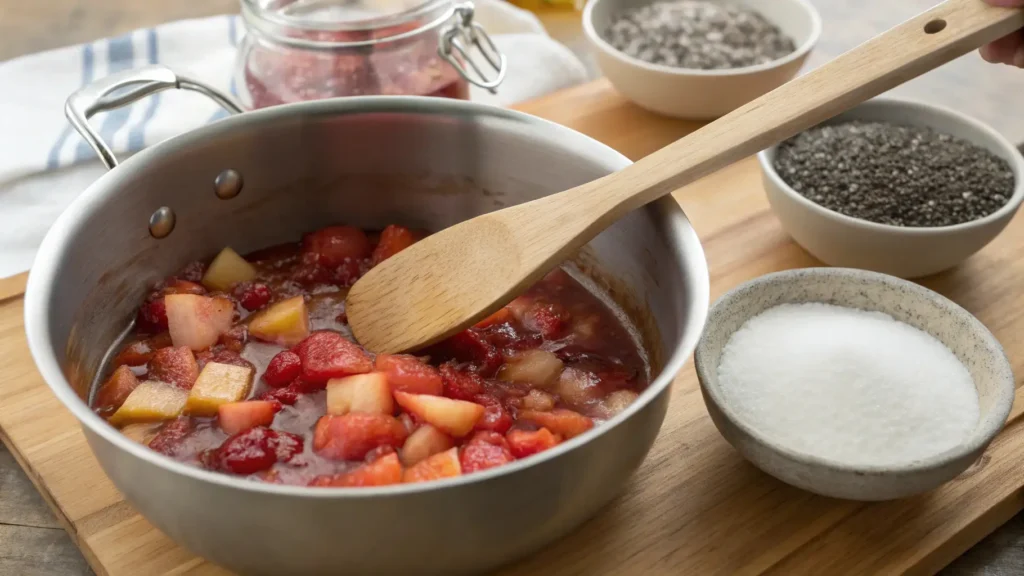Fruit compote is a versatile and delicious topping for desserts, breakfasts, and even savory dishes. However, achieving the perfect texture can sometimes be a challenge, especially if the compote turns out runny. Wondering, “How do you thicken fruit compote?”

In this comprehensive guide, we’ll explore the best techniques to thicken fruit compote, the tools and ingredients you can use, and practical tips to ensure your compote comes out perfectly every time.
Why Compote Can Be Too Thin
Before learning how to thicken fruit compote, it’s helpful to understand why it might not achieve the desired consistency. Here are the most common reasons:
1. Excess Liquid from Fruit or Additions
Some fruits, especially those high in water content like berries, release more liquid as they cook. Adding extra water or juice during the cooking process can further dilute the mixture.
2. Insufficient Cooking Time
Compote thickens as it reduces on the stove. Rushing the cooking process or using too low a heat can leave the mixture thin and watery.
3. Lack of Thickeners
Unlike jam, compote often relies on its natural ingredients for texture. If the fruit lacks sufficient pectin—a natural thickener—this can result in a runny consistency.
Related Article: Discover creative ways to use fruit toppings with Blueberry Compote Recipe.
Best Methods to Thicken Fruit Compote
There are several simple and effective techniques for thickening fruit compote. Let’s dive into each method:

1. Simmer the Compote Longer
The simplest way to thicken fruit compote is to cook it longer over low to medium heat.
- How It Works: As the liquid reduces, the compote naturally thickens.
- What to Do:
- Stir frequently to prevent the fruit from sticking or burning.
- Use a wide, shallow pan to speed up evaporation.
Pro Tip: Avoid covering the pot, as this traps steam and prevents the liquid from reducing.
2. Use a Cornstarch Slurry
Cornstarch is a quick and easy thickening agent that works for most fruit compotes.
- How It Works: Cornstarch binds with the liquid in the compote to create a thicker texture.
- What to Do:
- Mix 1–2 teaspoons of cornstarch with an equal amount of cold water to form a slurry.
- Gradually stir the slurry into the simmering compote.
- Cook for 1–2 minutes until the compote thickens.
Pro Tip: Avoid adding cornstarch directly to the hot compote, as it can form clumps.
3. Add Chia Seeds
Chia seeds are a natural, healthy thickening option that also boosts the nutritional value of your compote.
- How It Works: Chia seeds absorb liquid and swell, creating a gel-like consistency.
- What to Do:
- Stir 1–2 teaspoons of chia seeds into the compote after it has finished cooking.
- Let the compote sit for 10–15 minutes to allow the chia seeds to thicken the mixture.
Pro Tip: Chia seeds work particularly well for no-cook or lightly simmered compotes.
4. Incorporate Pectin
Pectin, a natural thickener found in many fruits, can help achieve a firmer compote.
- How It Works: Commercial pectin powders react with sugar and acidity to create a thickened consistency.
- What to Do:
- Add 1–2 teaspoons of pectin to the compote while it’s cooking.
- Stir thoroughly to prevent clumping.
Pro Tip: Slightly underripe fruits contain more natural pectin than fully ripe ones, so using a mix of ripeness can help thicken your compote.
5. Mash or Puree the Fruit
If your compote is too thin, mashing some of the fruit can help thicken it naturally.
- How It Works: Mashing releases the pulp and natural pectin, creating a thicker texture.
- What to Do:
- Use a fork, potato masher, or immersion blender to crush some of the cooked fruit.
- Leave part of the compote chunky for a rustic texture, if desired.
Pro Tip: This method works best for fruits like strawberries, blueberries, or peaches.
6. Add a Thickener Like Arrowroot Powder
Arrowroot powder is a gluten-free alternative to cornstarch that provides a glossy finish.
- How It Works: Arrowroot absorbs liquid to thicken the compote without affecting the flavor.
- What to Do:
- Mix 1 teaspoon of arrowroot powder with water to create a slurry.
- Stir the slurry into the compote and cook for an additional 1–2 minutes.
Pro Tip: Don’t overheat arrowroot-thickened compotes, as high heat can break down its thickening properties.
Related Article: Learn more about fixing runny fruit dishes with Why Is My Blueberry Compote Not Thickening?.
Tips for Perfectly Thickened Fruit Compote
When thickening fruit compote, small adjustments can make a big difference. Follow these tips to ensure a luscious, velvety consistency every time:

1. Balance the Liquid
Always consider the water content of your fruit and adjust the liquid accordingly to prevent a runny consistency.
What to Do: If you’re using high-moisture fruits like strawberries or blueberries, reduce the amount of added water or juice in your recipe. Fruits like peaches or apples may require slightly more liquid.
Why It Works: Less added liquid allows the compote to naturally thicken without extended cooking or additional thickeners, preserving the fruit’s fresh flavor and texture.
2. Be Patient with Simmering
Thickening compote through slow reduction is a simple, natural method, but it requires time and patience.
Pro Tip: Use medium heat to speed up reduction while stirring regularly to prevent burning or sticking. Simmering too aggressively can break down the fruit too much, affecting the final texture.
3. Taste and Adjust
Thickeners like cornstarch, chia seeds, or pectin can slightly alter the flavor of your compote, so it’s important to taste as you go.
What to Do: Adjust the sweetness or acidity with sugar, honey, or lemon juice as needed to balance flavors without overpowering the fruit.
Why It Matters: Over-thickening with starches or alternative thickeners may dull the fresh, natural taste of the fruit, so adjusting as you cook ensures the perfect balance.
4. Use the Right Tools
The cookware and utensils you use can directly impact the compote’s consistency and texture.
What to Use: A wide, heavy-bottomed pan promotes even heating and faster liquid reduction without burning.
Best Stirring Method: Use a silicone spatula or wooden spoon to stir gently and preserve chunks of fruit rather than breaking them down too quickly.
5. Cool for Final Texture
Compote continues to thicken as it cools, so avoid over-thickening on the stovetop.
Pro Tip: Let the compote rest for 10–15 minutes before deciding if additional thickening is necessary. If it still feels too thin after cooling, return to low heat and simmer slightly longer.
By following these simple techniques, you can achieve perfectly thick, flavorful fruit compote every time!
FAQs About Thickening Fruit Compote
1. Can I thicken compote without adding sugar?
Yes, you can thicken compote without sugar by simmering it longer or using natural thickeners like chia seeds or mashed fruit. These methods enhance texture without relying on added sweetness.
2. How do I fix over-thickened compote?
If your compote becomes too thick, simply add a tablespoon of water, juice, or lemon juice. Stir gently over low heat to integrate the liquid until the compote reaches the desired consistency.
3. Can I freeze thickened fruit compote?
Absolutely! Thickened fruit compote freezes well in airtight containers or resealable bags for up to three months. Thaw it in the refrigerator overnight and reheat gently on the stove before serving.
4. What’s the best way to thicken compote for baking?
For baking applications, use pectin or cornstarch to ensure a sturdy consistency that holds up during cooking.
5. Why does some fruit compote naturally thicken more than others?
Fruits like apples, blackberries, and cranberries contain higher levels of natural pectin, which thickens compote naturally. Low-pectin fruits, such as strawberries or cherries, may require additional thickening agents.
Conclusion: How to Achieve the Perfectly Thickened Fruit Compote
So, how do you thicken fruit compote? The key lies in understanding your ingredients and choosing the right method for your recipe. Whether you prefer natural reduction, cornstarch, chia seeds, or pectin, there’s always a way to fix runny compote and achieve the perfect consistency.
With these tips and techniques, you can create a thick, luscious fruit compote that enhances your favorite dishes, from breakfasts to desserts. Experiment with different methods and ingredients, and enjoy the versatility of this delicious topping!
